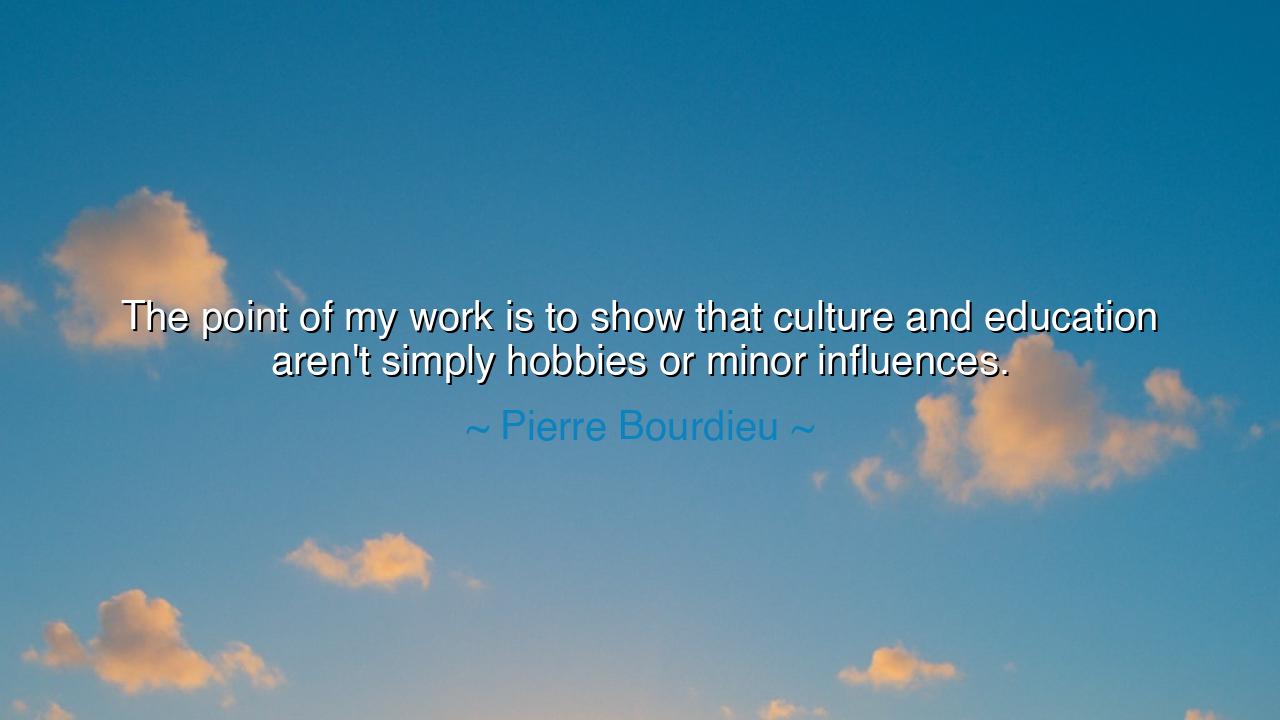
The point of my work is to show that culture and education aren't
The point of my work is to show that culture and education aren't simply hobbies or minor influences.






Hear now the words of Pierre Bourdieu, the great thinker of society, who proclaimed: “The point of my work is to show that culture and education aren’t simply hobbies or minor influences.” This declaration is not a passing thought, but a thunderclap of wisdom, reminding us that the forces shaping the human soul and the destiny of nations are not only wealth and power, but also the unseen currents of learning and culture. For what we read, what we value, what we pass to our children, and what we honor in our societies, these are not ornaments—they are foundations.
Too often, men of narrow vision have treated culture as a pastime, a luxury for the idle, a pursuit for the few. They have seen education merely as preparation for labor, as if its worth were measured only in wages earned. But Bourdieu’s insight pierces this illusion: he shows us that these are not “minor influences,” but forces that carve the very shape of human destiny. Culture molds our values; education forms our minds; together they determine how high or how low a society may rise.
Consider the story of Frederick Douglass, once a slave, who discovered that learning to read opened the gates to freedom. To the master, reading was a dangerous luxury, a hobby denied to the enslaved. But Douglass revealed its true power: education was not a pastime, but a weapon against oppression. Through knowledge, he overpowered chains of ignorance and became one of the greatest voices for liberty. Here, the truth of Bourdieu’s words shines bright—what others dismissed as minor became the very power that changed history.
History, too, offers us the example of Renaissance Florence, where the flourishing of art, literature, and philosophy transformed a small city into the heartbeat of Europe. To the unwise, painting and poetry may have seemed mere entertainments. Yet in truth, culture inspired revolutions of thought, fueled discoveries in science, and laid the groundwork for the modern world. Those who dismiss culture as minor are blind to its hidden strength: it is the seed from which whole civilizations bloom.
The meaning of Bourdieu’s teaching is this: culture and education are not the adornments of life; they are its architects. They determine not only individual possibility, but also the structure of society itself. Those who have access to learning and culture inherit not hobbies, but advantages. Those denied them inherit chains, invisible but powerful. Thus, if we seek equality, if we seek justice, we must not treat education and culture as luxuries for the few, but as rights for all.
Let this be the lesson for you, O listener: never belittle the shaping power of books, of art, of music, of schools. They do more than entertain—they plant values, stir imagination, and shape destinies. If you wish to grow, steep yourself in culture and pursue education not as pastime, but as a lifelong calling. And if you wish to lead, ensure that others, especially the poor and forgotten, are not denied these treasures.
Practical action lies before you: read not only for pleasure, but for transformation; engage with art, history, and philosophy as food for your soul; support schools, libraries, and teachers; defend the right of every child to learn, not just a skill, but the vastness of the human spirit. In doing so, you do not indulge a hobby—you help shape the pillars of a just and flourishing world.
Thus remember the wisdom of Pierre Bourdieu: culture and education are not side paths, but the main road upon which all societies travel. To dismiss them is to court decline; to honor them is to build a future worthy of humanity’s highest hopes.






AAdministratorAdministrator
Welcome, honored guests. Please leave a comment, we will respond soon